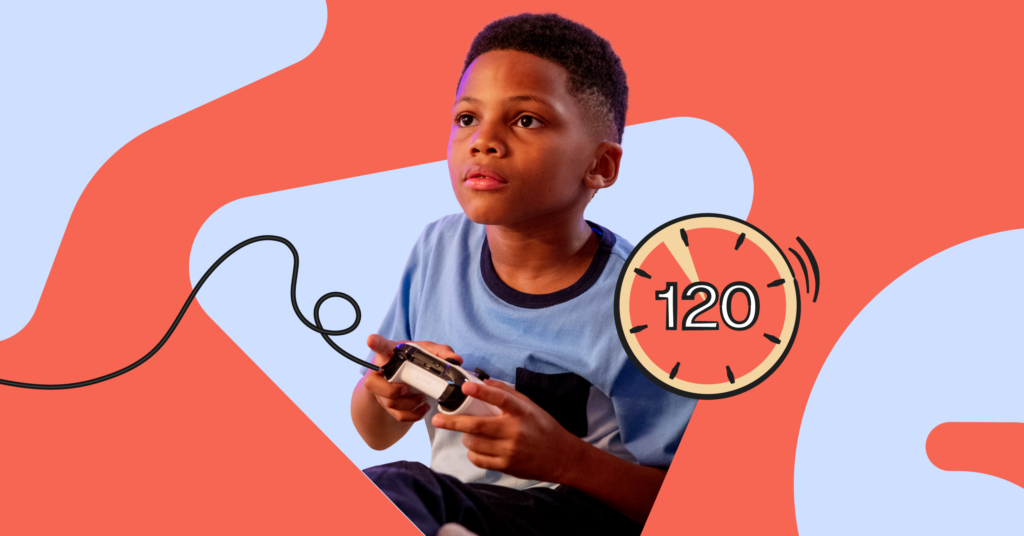
For years, video games have dominated the free time of young people. And in 2023, there’s certainly no shortage of ways to play your favorite game, from consoles and phones to computers and virtual reality. But while video games can be a beloved part of childhood, it’s important for parents to balance how much time their kids spend playing them.
Unfortunately, video game addiction is a real issue and can affect your child's schoolwork, relationships, and even health. But luckily there are signs parents can look for if their child needs help managing their video game time. Once you know them, you can intervene and talk about healthy boundaries if your child is addicted to video games.
Signs Your Child May Be Addicted to Video Games
Loss of interest in other hobbies
Hobbies play a crucial role in kids’ development, as it introduces them to new things and teaches specific skills. Video games are great as one of your kid’s hobbies — but it gets tricky if it’s their only hobby.
If your child starts to consistently skip other activities they used to enjoy — like playing sports, painting, or hanging out with friends — it might be a sign of video game addiction. Keeping your child’s time balanced between video games and other hobbies or activities can go a long way in keeping addiction at bay.
Falling grades
School can be hard enough without the strong temptation to keep building in Minecraft or start another game of Fortnite! If your child is struggling with video game addiction, it probably won’t take long for it to show in their grades. Once homework time gets replaced with game time, kids will eventually find themselves in a tough spot with their classes.
It’s an uphill battle once the grades slip, so it’s best if kids wait to pick up the controller until all their work is done. That way video games can be a reward instead of a distraction!
Aggressive behavior
Have you noticed your child be particularly aggressive after they’ve been playing video games for a long time? For some children, video games can cause them to exhibit increased angry behaviors. This may be because the games they’re playing are violent in nature, or they simply get overly frustrated when they are told to stop playing.
If you find your child is getting unusually upset with you when you limit their video game time, it might be a sign they’ve become addicted to gaming. The more out-of-character their reaction, the more likely it is that they need a good break from video games.
Mood swings
Part of growing up is learning how to control your emotions, and sometimes it takes a while for kids to develop this skill. If you feel like your kid has really high highs and really low lows, it could very well be a natural part of their growing up — especially during the preteen and teen years. However, this could also point to a larger issue if the mood swings seem more extreme than normal and they’ve been spending longer amounts of time on their games.
Isolation
One of the biggest downsides of video games is how isolating they can be. Of course, this isn’t always true, as video games can be enjoyed with others and they often are. But it’s not uncommon for kids to get so wrapped up in the game, they end up being alone in their room for hours. Whole weekends could fly by if you’re careful.
When it comes to playing video games with others online, it’s important to exercise caution. While it’s not always a bad thing, it shouldn’t completely substitute in-person socialization. Not to mention — there’s an increased risk that your kid could start chatting with strangers and potential predators the more time they spend online.
Building in-person relationships are crucial in a child’s development and a video game addiction can easily impede that. Be sure your’s child’s time is balanced with social activities, as well as time to relax at home when they need it.
Increased conflict with friends and family
Of course, kids are always going to have their harsh moments even if they’re not addicted to video games. A part of growing up is learning how to handle conflicts. What parents should look for is consistent behavior where they lash out against friends and family. This — coupled with other symptoms — could point to a video game addiction.
Again, you know your child best and you’ll know this behavior calls for a closer look into their gaming habits.
Withdrawal symptoms
One major sign of video game addiction is how your child reacts when you take them away. If they express intense anger or any emotional distress, then it’s clear they have an unhealthy relationship with video games. This can be similar to withdrawal symptoms, which are an inevitable part of any addiction.
Physical issues
Video games can take a physical toll as well, causing damage to eyesight, back pain, joint soreness, and headaches. This can cause severe discomfort and could even lead to permanent damage if healthy steps aren’t taken.
Hygiene concerns
Now, lots of kids have hygiene issues — especially going into puberty when putting on deodorant hasn’t become a daily routine yet. But if your child is addicted to video games, it’ll be more intense than that. Maybe they won’t shower for days and they constantly wear dirty clothes — and this goes for their bedroom as well. You might notice things like the bed is never made and there’s always trash or clothes on the floor.
Essentially, kids with a video game addiction will shift all their priorities so they can game as much as possible. Even if most kids don’t necessarily care about a clean room or having the best grades, addiction will make it even harder to keep up with those responsibilities.
Constantly talking about video games
Kids always love to talk about their interests and whatever game they’re currently playing. But does it seem like it’s all your kid can talk about? If it seems like every conversation with your child goes back to their games, it could be another sign that they have an extreme attachment to their games.
Remember that it’s actually a really good thing when kids express their interests and have a passion for something — even if it is video games. But parents will want to make sure it’s balanced and doesn’t keep them from living healthy, normal lives.
How to Support Your Child
If you’re worried about your child’s video game usage, the best first step is simply talking to your child about it. Ask them why they enjoy video games and try to understand their perspective before jumping to conclusions. If your child does have a video game addiction, remind them that you are always there to support them as you take steps to get them help.
Bark also wants to support your family when it comes to screen time and technology use. Our service lets parents monitor what their child is doing online so they can see if there are causes for concern related to video game use. It can also help parents manage screen time to ensure that their children are not using their devices more than they should be. Start your free trial today!
Read more
Bark helps families manage and protect their children’s digital lives.





